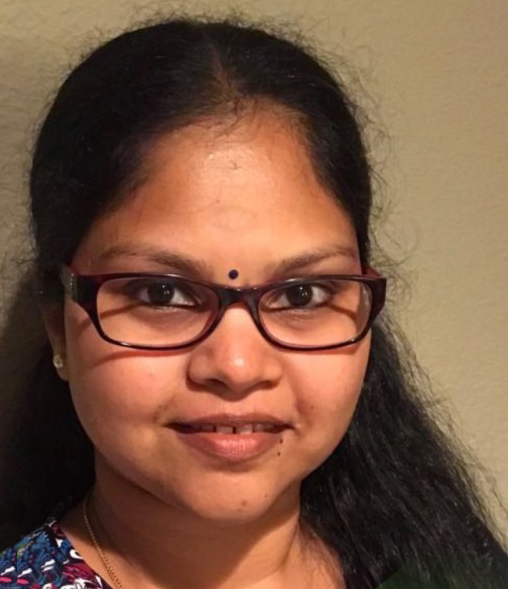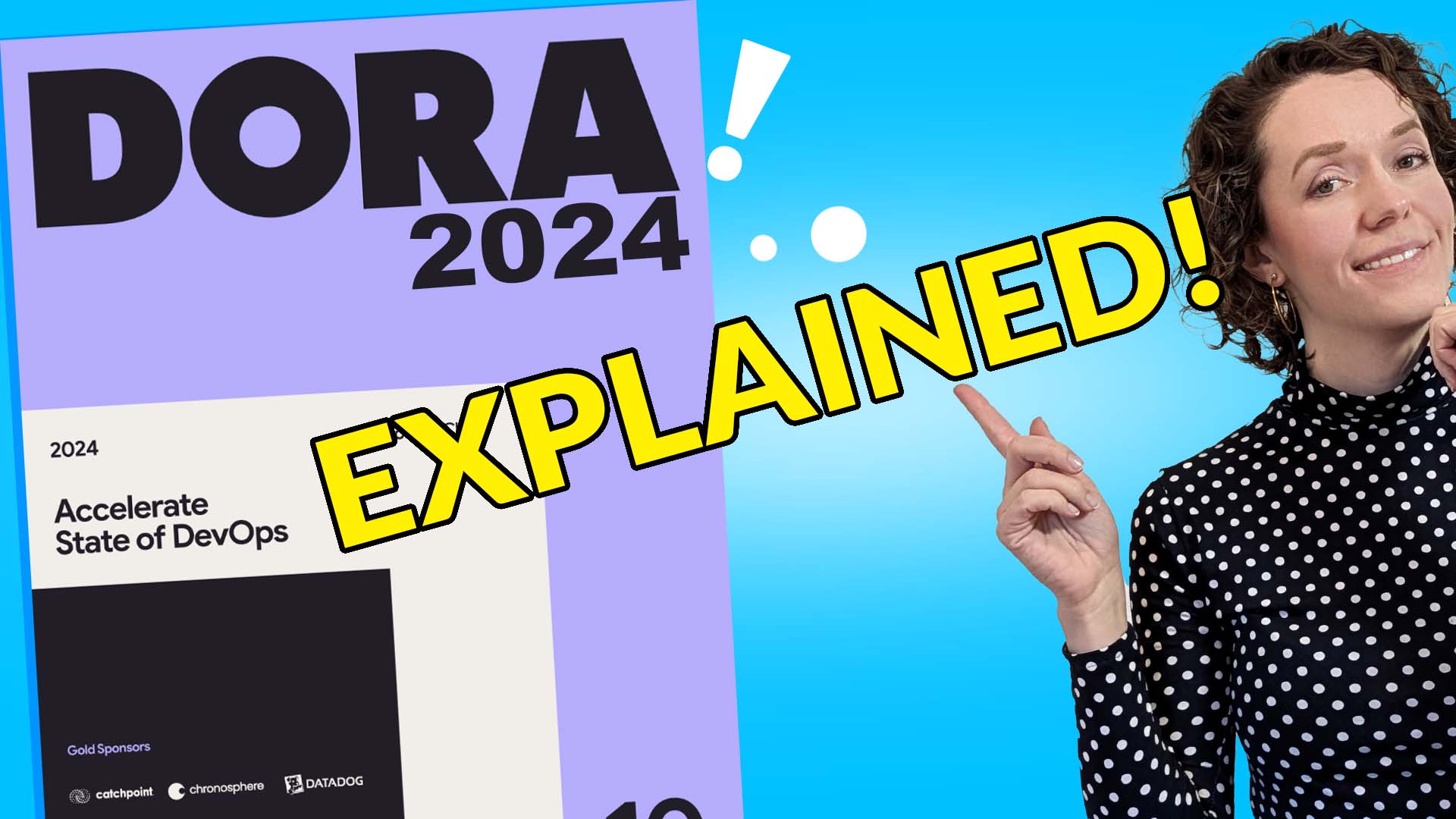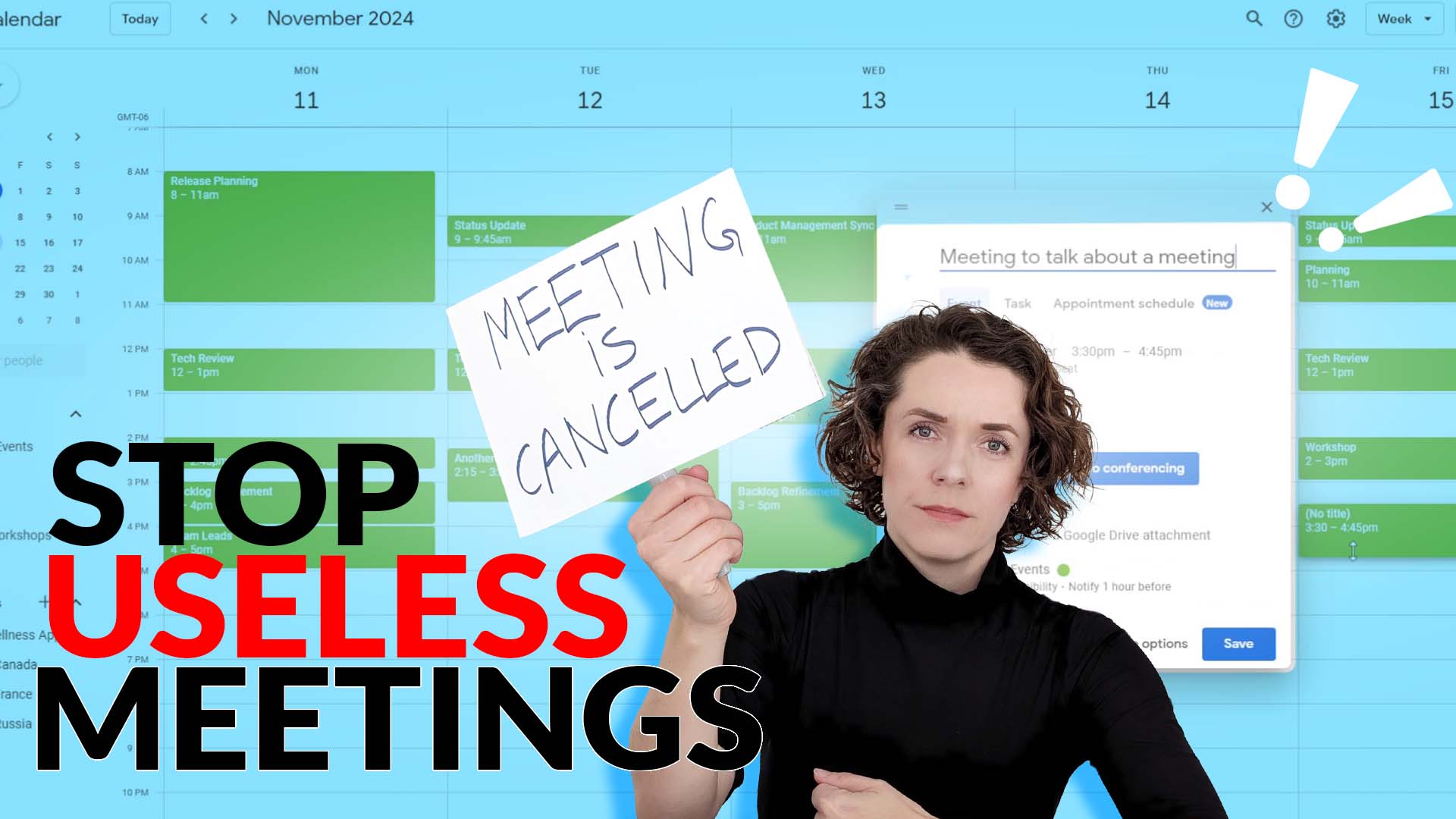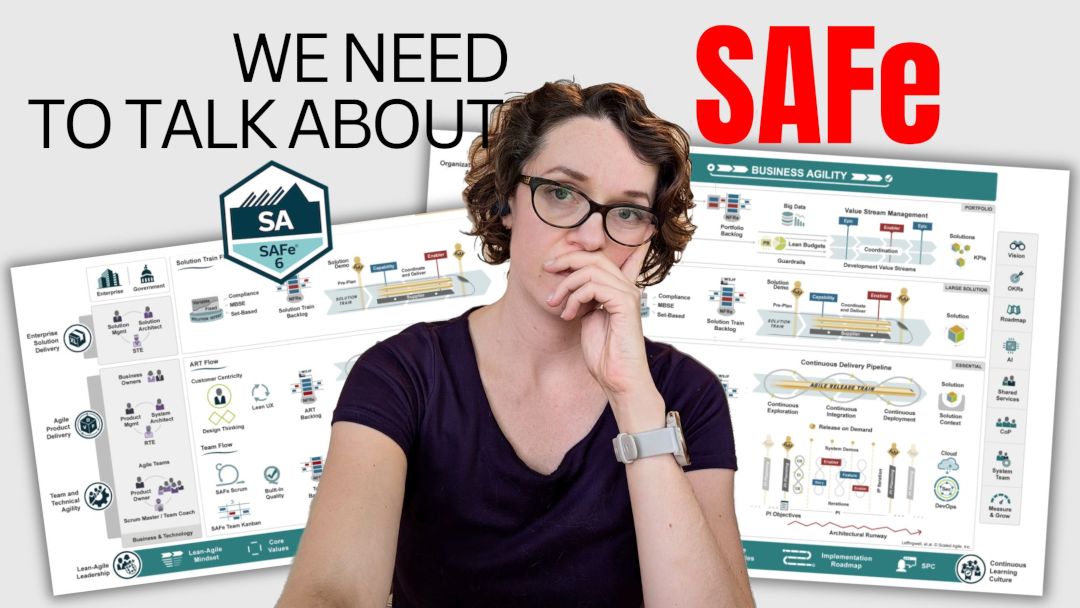Today’s episode will be a little bit different as I am sharing three conversations I had in-person during the Scrum Day Madison this September. The people I’m talking to are the co-organizers of the Scrum Masters of the Universe meetup.
We’ll hear their stories and journeys into the Scrum Master roles. We discussed the challenges (as always 🙂 and their success stories. And I also asked them what they think about the Scrum Master salary – what should it be?
Since it was the first time I used my equipment to film in person, the video is not ideal, sometimes it gets a bit choppy, and sometimes it’s out of focus. But the discussions we had were insightful as always.
Let’s get started!
About Jamie Kriegel

The first person I’m talking to is Jamie. She is a Scrum Master with a lot of experience and I’ll let her tell the story of how she came to be a Scrum Master.
She is the founder of the Scrum Masters of the Universe meetup – a global virtual community of Agile professionals that offers collaboration and growth for all those seeking to master their craft.
She is also a Scrum Masters Pathway Guide.
In this conversation, she shares her journey. We discuss the challenges we face with engagement, especially during retrospectives. And we also discussed how to create more teamwork and collaboration in remote teams, where informal friendly communication is not as common.
🔗 Connect with Jamie on LinkedIn
📌 Join the Scrum Masters of the Universe community
Transcript of the discussion with Jamie
Jamie: Here we are, scrum day 2023.
Daria: Yeah. I will, first of all, I’m really happy to actually meet you in person
Jamie: for the first time. Yeah. It’s been a while, right? We’ve been working together.
Daria: Good to be here. So I wanted us to just really have a chat, you know, about scrum mastery, about the past. of a scrum master, obviously hear your story, how you became a scrum master, hear a bit of your, maybe some challenges that you faced while you were helping the teams, and your success story.
So, yeah, let’s start with how it happened, you know, how you became a scrum master.
Jamie: So I actually started off with, um, Believe it or not, I started off with Applied Linguistics as my major, which is teaching English as a second language. So I did that for a bit after I graduated. So I taught in Japan. Um, when I came home, I went back to school to get my elementary teaching certification.
I got that and then realized that my husband and I can’t afford to both be teachers because, okay, once we started having kids because of insurance reasons, I worked as a corporate trainer. And I was a very small construction company. And so they had me helping with their accounting system conversion.
And so that was my introduction to programming. So I worked as a software developer for probably 16 years. And, um, that journey led me into being a scrum master. Really, it started with lean before scrum. We were doing lean manufacturing, really got interested in continuous improvement. So the inspect and adapt and was already doing that with my own code and, and with developers that I was onboarding, then our company started their agile transformation.
And so our team was the first scrum master team, um, as a pilot. Anyway, I became scrum master of that team and that started my journey. I was doing mostly mechanical scrum at that point because, right, you just, you get your CSM. And then you’re
Daria: like, how do I do that in
Jamie: real life? And how do I do that in real life?
Because we don’t go over all these scenarios and, and the real life scenarios is, it’s much different than just what you learn in a CSM course. Yeah,
Daria: it kind of stays pretty theoretical even if you do kind of some case studies. Yeah. You don’t see it. Okay. Well, how is this going to happen with the team?
Yeah,
Jamie: exactly. Every context is different. Every team. It’s interesting to me how teams have their own personality. Yeah, because, you know, I have one team that. They can be quiet and they really hate themed retros or something like that. Another team that’s like, we want to play more games. And the other team’s like, we want to work.
And so it’s a challenge. You have to get to know their personalities and you have to meet them where they’re at. Yeah. And that’s been my biggest lesson that I’ve learned over, it’s been eight or nine years as a scrum master now. And the biggest lesson I’ve learned is. is for one thing, patience, because change does not happen overnight.
You know, we all go in great gusto. We heard about this new great thing, and now we want to go try it with our teams. It just doesn’t work that way. So meeting them where they’re at is my next tip that I learned. Make sure you have patience. Meet your team where they’re at and go from there and eventually incrementally taking that 15 percent solution or that first small step that we have control over as a team to change doing that goes that up over time to a lot more.
Yeah,
Daria: great. Yeah, so. What was your biggest challenge with the team?
Jamie: And this has been several teams probably engagement, especially during retrospective. It seemed two things. They really struggled with sprint goals, coming up with good sprint goals, and making sure they’re actionable and they’re not just writing, I’m going to complete all the stories in a sprint, or, or somehow, Writing the Sprint goes so that it describes every story of the Sprint.
Yes. Right. That’s been challenging with every team I’ve had. Every new team I’ve had, whether they’re established or not, I’ve had to teach them about Sprint Cluster, you know, that really, if you get that down salad, then, then you have your true north, right? We know we have a shared purpose. So my other biggest challenge is engagement, especially in retrospectives.
Daria: Oh, yeah. A lot of people are struggling with that, right? Yeah. Especially when you have a team where it’s like, we don’t want to do anything fun.
Jamie: We just want to work. And so, you know, cultural, the cultural difference come in, come into play here. And then some cultures, um, that’s not cool to do at work, um, on their employer’s dime.
Somehow they feel guilty, like, we have to be working all the time. Yeah, and they don’t realize that some of the things we’re doing together as a team is we are working and this is what But it’s you know, it’s team building and I really believe in humanizing the workplace and and bringing humanity And you’re not just Joe the developer or Lisa the developer.
You’re you have three dimensions Yeah, or four dimensions
Daria: Also a person, right? A human. So we want to connect and build that relationship. Because I feel like when you build good relationships with people you work with, then work is, feels so much better. Like we spend so much time at work. So isn’t it great to work with people who you actually like know something about and you like?
Jamie: And you can make those connections, and then those carry you through, right? Those hard times and the good times. So I always say, how do you work together if you don’t know each other? So
Daria: how did you approach or resolve those challenges when you were working on the team? Or maybe you’re still searching for the perfect
Jamie: solution.
I don’t know that there is a perfect solution because every team is different. Um, one team, um, right now that I’m working with, I have tried to. So, you know, if you’re in an office building and you’re, you’re going to a meeting, you’re all going to stand around in the room and talk to each other a little bit before the meeting.
Yeah, so I’m trying to build that in virtually build and save space for that and say, just because it’s a 15 minute daily scrum doesn’t mean that our daily scrum has to start at 9 o’clock. It could be that that 15 minute timer starts at 9. 05, we spend the first 5 minutes that we get here chit chatting together and.
And we’ve been successful on one team and the other team is, they’re a challenge. I hope none of them see this video. Well,
Daria: maybe they see it and say, okay, maybe we need to change that. Yeah,
Jamie: maybe, maybe I’ll help
Daria: them. So did you find any ways to kind of engage people in retrospectives a bit more?
Jamie: With one team, I could do any kind of retro, and they’re engaged, and their thinking is at a deeper, higher level of thinking, but I think some people just aren’t used to thinking about things the way that we want them to think about in retrospectives.
And so for some of those teams, I went back to more of a lean coffee or a simpler format just to get them talking and engaged and making the agenda theirs. But I’m hoping as they mature, then we’ll be able to get back to some of those rituals that allow us to look at things through different lenses.
Tell
Daria: us, uh, your biggest success story or your favorite
Jamie: one. Oh, my favorite one is probably, um, not really related to, it’s related to giving back to the Agile community and giving back to Scrum Masters. And, and so I founded Scrum Masters of the Universe, which is a meetup that, that you’ve spoken at several times.
My goal behind that was to get Scrum Masters out of their silo. Yeah. And really learn the collective intelligence of, of other people. But over the years, it’s become more, we’ve gotten more and more attendance. It’s not just scrum masters anymore. It’s really about agile professionals. And so we left the name scrum masters of the universe because that’s what people, they already knew that name and they recognize it.
And I didn’t choose it. Um, my first group that met. Voted on a name and picked it. So it’s a stuck and somebody made this nice logo for me with these uniform or these heroes in it. And so, but yeah, that’s probably my biggest success story though. We’re now at right around 4, 600 members and we’re, we’re growing every day.
So, um, and I love that group. I love giving back to the community and I love those like you who are willing to come and share your time and knowledge, also giving back to the community through that as well. And so it’s, it’s a win win because I get to give back, you get to give back, and they get to learn.
Yeah. So the more of that we can do, we’re trying to grow our leadership team so that we can offer more and more for that. So yeah, I would say that’s probably my biggest success. And the most fun. Yeah, I love
Daria: going to, uh, I think even talks at the Scrum Master meetups or, you know, because people are so much more engaged in there.
They want to learn, you know, they’re like, yes, please
Jamie: tell me more. Yeah. And they do ask questions.
Daria: Yes, exactly. I’ve been to a couple of, I think, meetups that were not as focused like on Scrum Masters. And it was just, you know, crickets. You ask a question, no one talks. I’m like, okay, I don’t know how to deal
Jamie: with it.
I hate crickets. Now you should use Butter. Have you heard of Butter? No. So Butter is a platform much like Zoom. So check out Butter. It has like the ability to do everything you do in one platform. So you can actually bring your mirror board right in. Okay. You can do all your sound effects off to the side like crickets.
Like if nobody’s talking you can put the crickets sound on. But it also has polls. You can pull up any kind of media you want inside there. And the people there can actually interact with the mirror. Right within the butter session, so it’s Okay. Cool. Um, I don’t work for Butter, so not sponsor not sponsoring, but, um, I’m building a workshop around butter at that platform right now.
Yeah. Um, for the end of October, so. Mm-hmm. . Nice.
Daria: Yeah, I I used a similar one that was a sponsored video when I did IS sessions and it kind of does the same thing, which I found really nice. Yeah. Because it does create that seamless experience and I think in a way as. Like, Scrum Masters or people like we’re working with teams, we often need to find the best way to help them work, right?
Yeah, whether it’s a project management software or like a collaboration tool, like, you know, butter. Um, so I think that we always are kind of on the search for something like that.
Jamie: Yeah, yeah, I think so too. Yeah, I can think you can make or break the difference between a successful workshop or class and not.
Yeah. Definitely. Yeah. What are you working on? Uh,
Daria: well, I’ve just finished the product owner guide, which I was super happy about, you know, I feel like we obviously have lots of resources for scrum masters. Um, not all of them are amazing, but, you know, we have a lot of them that have, uh, the meetups and everything.
Jamie: I think I have most of them, most of your Scrum Master. I can’t find them. We
Daria: often find that, like, I worked with so many teams where the product owner is so new, right? And the same as with Scrum Masters, no one actually knows what the role of the product owner is. You know, and then Scrum Master is struggling, but at least there’s like this community around it where everybody’s like, okay, what is that role?
But for product owners, it’s kind of sometimes feels that they’re kind of left alone to like figuring things out. And their role is so hard, right? They need to immediately from day one, they need to work with stakeholders. Mm hmm. They need to know how to manage those citations and present information like reports and I feel like they’re sometimes they’re so lost and that what makes product owners into more of like order takers because.
They don’t know that they should
Jamie: have the power. Right. They don’t know that, that they are empowered, that they need to be empowered, and if they’re not, then they need to fix that fixed because they can’t do their job unless they’re empowered to make those decisions. Yeah, and definitely, I, I’ve worked with some product owners who didn’t feel empowered, and that was very difficult because then, you know, things kept come being thrown at us, and finally he’s like, no.
I’m like, what do you mean no, ? I mean, Okay, we can move 3 things here. Right? Because you still have the iron triangle at play. Yeah, he’s like, okay. I mean, if you really want us to bring this in, you can’t hold us to this delivery date or I struggle with the bringing in resources thing. I don’t like the word resource.
I struggle with the bringing more. people in because because that actually is going to slow the team down first before they speed up and if you’re under like a three month kind of time span that they’ll be on board at just about the time that it so what’s going to move right it’s either going to be time or scope take something out yeah he’s teaching them Like, I said, you empower yourself.
Oh, yeah, that’s true. Because you can say, you just give them the data. Yeah. And say, here’s the data, here’s how, here’s where we’re at. And this is the work that we have. And we’re already, you know, three weeks over the, over the delivery date. Because of added scope. Yeah. But if you’re going to keep adding scope and not taking any scope away, then, then the only thing that can budge is that delivery date.
Yeah. And there you have it. And so if you just give them the data, because that’s what they think in terms of data, right? Mm hmm. And approach it that way. This is what I suggest. So even if they’re not empowered by the business, they’re empowered to present the data and say it’s not possible.
Daria: I feel like that’s kind of interesting that a lot of what we preach, all that is kind of common sense.
And sometimes I find it difficult to say, Hey, like, you do understand this basic, like, triangle. Yeah, yeah. It, it will, it will move the date. I don’t like it. Well, I know, but that’s how reality works.
Jamie: Yeah. I mean, what choice do you have? Cause we’re not going to work 24 hours around the clock. And
Daria: even if we do, it’s actually not going to be sustainable.
We’re going to crash at some point, right? Interesting, the, how we’re bringing in that information. Sometimes they were like the messenger, right? Yeah. And some organizations shoot the messenger. You do
Jamie: get that. You do get some of that. Yeah. Right.
Daria: And then it comes back to, oh, strong. Doesn’t work here. What do you say to that?
Jamie: I say, okay, well, let’s do it your way as an experiment. How do you want to do it? Let’s try that and see. Let’s, let’s try that for two months as an experiment and see how things are going and then tell me if they’re going better or not. I believe in Scrum. I think it works. I think it works well. I think oftentimes they don’t work.
So, and they say Scrum doesn’t work. Yeah, that’s, that’s really the problem is they’re, they’re not using the framework appropriately or staying within the guardrails of the framework because it’s, it’s not very prescriptive and it’s not very prescriptive on purpose. But it does have some prescription and those are guardrails, so we, if we stay within those guardrails, um, presented in a scrum guide, you know, and then even then there may be times where we, you know, based on our context, we may have to do something different.
It’s not the end of the world. Ultimately, what do we want the outcome to be? Delivering value to our customers. Yeah, whatever we need to do to get there is what we need to do, I guess. Yeah, I
Daria: think it’s also balancing, right? Delivering the value, but also a working environment where people want to continue working, right?
I feel kind of sometimes gets forgotten because we say, Oh, we’ll just do it the old way when we push our employees until they burn out, right? Yeah. And we deliver something. I feel like that’s kind of helping to find that balance. Between the two, that’s the hard, the hard part because I was having this, well, I saw an ex, um, colleague, uh, one of the developers send me a little link to like a Twitter thread from someone with a really big following who was saying, Oh, um, I worked in Scrum.
It was absolutely terrible. It was like the new popular phrase, Scrum is cancer. And then he listed all the things and not a single one was Scrum specific. They were
Jamie: all like, I mean like, oh, Refinement went bad, or Boogie is going badly, or all these complementary practices to Scrum that are going terribly.
Our definition of ready is causing a phase gate and now we have this, well, definition of ready is not in Scrum yet either. Yeah, that’s true. So, I mean it. You can’t get in trouble with that if you’re not careful.
Daria: Yeah. Yeah. It’s hard to kind of find the, uh. I guess help people, you know, disconnect what Scrum is and what it isn’t.
Yeah. Because it’s so easy to just jump on and, um, on a practice or a metric and what we have. Tell us a bit more about these, what you do, Scrum Masters of the Universe. So that people can find you and, uh, you know, find your products and training as well.
Jamie: Another thing that I’m working on is, um, teaching through the Agile Mastery Institute and that’s called, um, Scrum Mastery Pathway based on Jeff Watt’s book Scrum Mastery and really digging into those.
Values of a scrum master that make a good scrum master and and really equipping scrum masters with tools for their toolbox that they could take with them that the difference between this course and another two day certification course is I think people need to get the fundamentals from these two day CSM course.
But I think once you have the fundamentals of scrum down, this is six months of a cohort to come for a two day class. Over the next five months we meet once a month and we really let our students create the agenda of the explorer class. Then they have these navigator sessions. So there’s over six months and then at the end they have a two day adventurer class and it’s really beneficial.
I’ve been through it myself and then I’ve also observed somebody else teaching it. Yeah. I think it’s a great thing. Again, I think there’s a place for both in, in, in the end streak. Yeah. Awesome. Reach out on LinkedIn to me if you want to know more about
Daria: that. Yeah, and we’ll have all of the links obviously in the description and of course Scrum Mastering of the Universe.
That’s where you can also
Jamie: find. Anyway, pleasure. It was a pleasure to be with you. Thank you,
About Mark Metze

Next I’m talking with Mark. He’s professional journey truly shows the power of the Agile community. He started as a developer and rose to the role of Development Manager. With the support and guidance of the Agile community he decided to make the transition to a dedicated Scrum Master.
Mark is also one of the key members of the Scrum Masters of the Universe meetup.
Mark’s belief in giving back is evident through his roles as a facilitator for the Scrum Masters of the Universe meetup and co-host of ‘The Agile Within’ podcast. In his personal life, Mark cherishes his roles as a loving husband, devoted father, and proud cat dad.
🔗 Connect with Mark on LinkedIn
Transcript of the conversation with Mark
Daria: Daria. Thank you so much. What made you switch and what, you know, what you liked about this?
Mark: Sure, so back really quick. I started out as a developer, then moved to a development manager and it felt like really I just read about this servant leader position of a Scrum Master.
And I feel like my mom was a registered nurse for 30 years before she retired. And what better servant leader could you think of than a registered nurse? And so I feel like I got her DNA in me. And so leading through serving was something that I was very passionate about and never looked back.
Daria: Awesome.
So what is your, I guess, the favorite part of this job? Because this is a hard job sometimes, right? So it is,
Mark: it is, but my personality is one that. I don’t like to be in front and be the person to get all the glory for everything that goes well. I would much rather be that supportive person in the back.
So for me, it just fits my personality. Daria, I wouldn’t die if I were in sales. I’m just not that type of a person. So for me to see someone else succeed, that’s really, that’s my personality.
Daria: That’s awesome. That’s great. How much money do you think a scroll master should make?
What’s a big range. You know from a hundred K to nine hundred to a million.
Mark: Well, it is a leadership position, right? So even though you don’t have people reporting to you, which is different than my experience of being a manager where I had people actually reporting to me and I had to fill out their performance evaluations.
Well, now I have to be a leader and I have to influence other ways that have people just do what I say. So, you know, 100, 000 at least I would think would be a good salary, at least starting off for a scrum master. Yeah, I agree.
About Anuradha Aravindh Raj

Next I’m talking with Anuradha. She is a dedicated Scrum Master with a unique blend of expertise in HR and event management. Her journey into the world of Agile began over a year ago, and since then, she’s focusing on helping the teams become more self-organizing.
Anuradha is another co-organizer of the ‘Scrum Masters of the Universe’ meetup group.
🔗 Connect with Anu on LinkedIn
Transcript of the conversation with Anu
Daria: How your journey started and where you are at right now? That’s a great
Anu: question, Daria.
I know I get this question asked a lot. So I’ve always been a change agent, right? We moved a lot of places in and around because my dad was a government servant. So I was not in a single school. I kept moving around. And the same happened when I moved here to the United States 10 years ago. And we had to move a lot of places because of my husband’s work.
And with little kids, it’s not easy. So kids kind of follow you around, but then when they grow up a little bit, they’re like, you know, I want to stay back. I want to be with my friends, right? Being a change agent, I kind of made them more curious to go look forward to it. At some point they’re like, yeah, yes, we are going to move to another state.
Yeah, I’m so looking forward to it. Being the people person that I, my background is from HR. I came from an HR background. So all these things put together and I’m like, that’s what you need a Scrum Master for, right? To be able to kind of put that seed or thought in you. To be able to see that, get you do that, be more efficient.
I guess, so that’s, that’s where it started and I thought, okay, I can be a good scrum master and being a mom and that is also something selfless, isn’t it? It’s like you want the team to be more efficient. I want the team to be very good at what they’re doing. So. That’s how it all started.
Daria: Awesome. Okay. And so did you transition from a different role or that’s
Anu: kind of how your journey started?
Right. So my journey started as a recruiter and then I eventually became an event planner because of life. So like what we’re doing today is from there, right? Yeah. So we had people, I had a hosted event where we had 500 people there. And I’ve also been a trainer. Coming in from a different country. So I wanted people here to learn the language that I came from.
Okay. So with my HR background, I recruited volunteers and I’ve also been a trainer. Okay. Great. So these were all kind of the skills that you want for Scrum Master, right? So coming from that, so all these transferable skills, I just took it in myself. And then, voila! Yeah, there you go. I have three teams now handling being a Scrum Master,
Daria: so…
How do you find the balance of kind of juggling
Anu: three teams? Right, so two of the teams I handle on a regular basis. The other team I’m doing freelance, so that is not… So for us, the streams there are just one month long, which I have enough time to breathe, you know? But the other two teams… That is perfect.
You know, we do have our daily scrums. We, uh, we do sprint planning refinements. We have enough time there, but for the third team, it’s not as, it’s not the two week screen, so I have a breather of that. It’s not as intense. Yes, yes, yes, right.
Daria: Okay, cool, great. What are some of the, I guess, the biggest challenges that you had to, like, overcome when working with teams in the role of Scrum Master?
Anu: Right, so, when I started, right, I’m an extrovert myself, I tend to talk a lot. A Scrum Master shouldn’t. You kind of have to be a great listener or an observer. So, I kind of just. Uh, think, tell myself, okay, you have to listen, listen better because I know you want to talk, I know you want to help people. And I also have these situations where, like, I want to give my input, but then I don’t want to, like, being a parent also, I guess, because you see, you know, your kid’s doing something, you know they’re going to get hurt, but then you’re like, okay, let them run, because you’re not going to be there every single time to help them out.
So that’s the same thing I did too, because I’m a very helpful person. I’ll just jump out of the way to help you. I just had to put myself a little back and say, okay, you have to let them do things themselves. So that’s, that was the most tough thing. And I’m still learning, I guess, I think it’s just a journey and I’m just
Daria: enjoying it.
Yeah. Yeah. Yeah. So, okay, great. What I guess would be the, like the biggest success story that you’re really proud of, where you could see, Oh my, like I was able to positively impact.
Anu: Right. Uh, so during retrospective, right. It is, it’s good. Sometimes it becomes a little bit nagging if it is not done right.
So, um, I kind of wanted the teams to have a very cheerful session. So I also wrote a post about it. One of the day, one day, the session ended with everyone smiling on a remote call. This is nice. This is how it’s supposed to be, right? I mean, you go back because, again, your sprint starts and then you want to have all that energy again and you want to complete it in a good note.
So I kind of made it the last five minutes just to be fun, right? Like, share some jokes, do something or the other. Just get out in a good mood. Like, for any event to end, you want to go out of the bag, right? Just to kind of have that motivation. So that’s what I did. I saw tremendous effect in that and I took a screenshot with all this permission, like, nice, I like this.
This is how we’re supposed to that’s what I did. That’s one small thing that you do. Yeah, and that’s what a lot of change and it was
Daria: nice. Yeah, and I think, like, you see that, like, kind of click, like,
Anu: yes, yes, exactly, exactly.
Daria: They don’t know it, but I can see it. Exactly, exactly.
Anu: As long as you know it, it’s fine.
Daria: Okay, great. Um, so do you have technical
Anu: background, or? No, I do not, but then I do, I am. It’s technical teams right now, but I do like learning. I learn a lot. I read books. I also, of course, the Atari, I have bought some of your session. So it’s like keep learning that the continuous improvement. We just don’t talk about the team.
It’s also for us to just to see what clicks and what you can do better for the teams. So in the process of that, I do keep learning a lot of things. That I can help the team with. If I don’t know something, I go probe the people and ask, what does that mean? But not during a meeting. I will be respectful of the time that they come in for and all that.
But then I’d always circle back and say, is this something that you can teach me? Or, you know, probably make me come and do, I want to join another project. Like just give me a challenge, give me something so that I can also do it. So no, to answer your question, I’m not technical, but then I am learning to be one.
But I guess to answer your question, it’s better for Scrum Master not to be technical. Because that’s one thing that you have to stop yourself from talking or giving suggestions about. And for the person that I am, like, I would jump in and I’d say, Why can’t you do this? And then, no, shoot. Lock it, right?
So that’s one good thing. But then to know the process, right? If you want to be, if you want to be a chef, you want to know how the restaurant runs, right? How many people are going to come? What are they going to cook? How many times you have to change the menu? All those things. So learning that process is nice.
That’s what I’m trying to do, but with the help of the team, and it’s not, it’s a combined effort, right? For me to help them. They can also help me. So that’s how it’s going.
Daria: Yeah, definitely. Yeah. I agree. I think like not having the technical knowledge, like. It actually helps, but you need to know like the terminology, right?
Like what it all thing, all those things mean, but you might not be the person who’s going to type the code. Exactly. Exactly. We
Anu: have people for that. We’re just trying to make them be more efficient and effective. That’s all you need to do.
Daria: Exactly. Exactly. How much do you think a scrum master should earn?
Or?
Anu: Or. Oh, wow. That’s a tough one. Yeah. If anybody’s trying to hire me, don’t judge me based on this. Okay, you’re trying to make teams more efficient, right? Like, this is asking how much should you pay a mother who’s taking care of her kids. That is, like, you can’t answer that question. Yeah. But then, I think it is fair you make, uh, at least 100, 000?
Yeah. to be the minimum, right? I see a lot of people just offering like 30 an hour, 25 an hour. That’s, I think that is also because there’s a lot of supply. And because there’s demand but the supply is a lot more and you have a lot of people out there who are okay, you know, they just need the break, they just need to get in.
And those are the kind of people who are okay with it and that’s why I think most of the industry is playing it solo, right? They see people coming and working for less. So they’re like, okay, I’m not going to pay more than this, but then they should, because what you’re doing is you’re not only, as soon as you become a scrum master, you’re giving two teams at least to help, right?
That’s a fact. So when you want to do that, you should be able to, you’re there as a change agent, right? You’re trying to help people, trying to make it effective or efficient. You’re putting in your work as well, so people should start realizing that. And pay the work, right? Exactly, so that’s how I do it.
Measure, and then pay
Daria: accordingly. Yeah, right? Well, I feel like sometimes they’re like, Oh, we don’t want to pay you too much money, but we also want you to do magic. Right, exactly! Like, well, wait a minute, you need to like,
Anu: Yeah, see us somewhere, right? Yeah, exactly. Nice, that was a great person. Thank you so much.
Thank you so much. Thank you for taking the time. Anytime.



